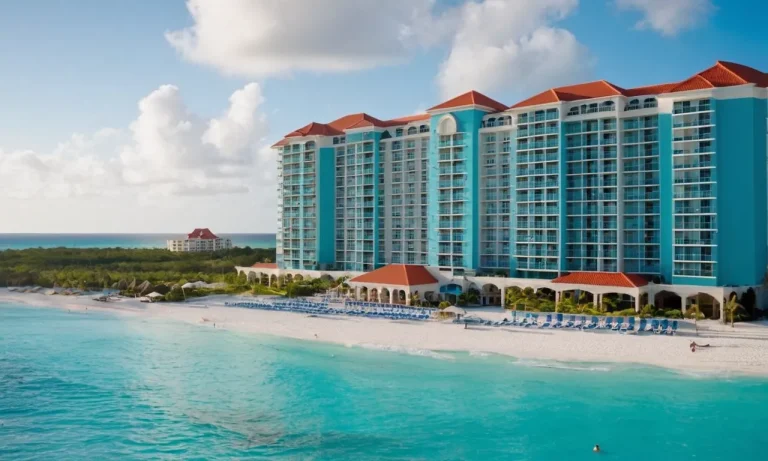Why Am I So Tired After My Cruise?
Feeling completely wiped out and exhausted after disembarking from your dream cruise? You’re not alone. Many cruisers experience extreme fatigue and tiredness post-cruise for a variety of reasons.
If you’re short on time, here’s a quick answer: The motion of the ship, activities, late nights, and readjusting to land can cause fatigue. Staying hydrated, resting, maintaining healthy habits, and easing back into routine can help.
In this comprehensive guide, we’ll discuss the scientific reasons why you may feel overly tired after your cruise and provide actionable tips to bounce back quickly.
Why You’re So Tired After a Cruise
Going on a cruise can be an exciting and enjoyable experience. However, many people often find themselves feeling exhausted and drained after their cruise. There are several reasons why this may be the case, including:
Motion Sickness Disrupts Sleep
One of the main reasons why you may feel tired after a cruise is motion sickness. The rocking and swaying motion of the ship can cause an imbalance in your inner ear, leading to feelings of nausea and dizziness.
These symptoms can make it difficult to get a good night’s sleep, leaving you feeling tired and groggy during the day. It’s important to take preventative measures, such as taking motion sickness medication or using acupressure wristbands, to minimize the impact of motion sickness on your sleep quality.
Activities and Late Nights Drain Energy
Another reason for feeling tired after a cruise is the sheer amount of activities and late nights that are often part of the cruise experience. From exploring different ports of call to engaging in onboard entertainment, there is no shortage of things to do on a cruise.
While these activities can be fun and exciting, they can also be physically and mentally draining. Late nights spent dancing, attending shows, or socializing with fellow passengers can leave you feeling exhausted the next day.
It’s important to pace yourself and prioritize rest and relaxation to avoid burnout during your cruise.
Readjusting to Land Takes a Toll
After spending several days or weeks at sea, readjusting to life on land can take a toll on your energy levels. Your body has become accustomed to the constant motion of the ship, and suddenly being on stable ground can feel disorienting.
Additionally, the change in routine and environment can disrupt your sleep patterns, leading to feelings of fatigue. It may take a few days for your body to fully readjust, so be patient with yourself and allow for some downtime to recover.
How to Regain Energy After Disembarking
After an exciting and eventful cruise, it’s not uncommon to feel tired and drained. The combination of constant activities, late nights, and the excitement of exploring new destinations can take a toll on your energy levels.
Fortunately, there are several ways to regain your energy and bounce back after disembarking.
Prioritize Hydration and Nutrition
One of the main reasons you may feel tired after a cruise is dehydration. Spending time under the sun, engaging in physical activities, and indulging in alcoholic beverages can all contribute to dehydration.
To combat this, it’s important to prioritize hydration by drinking plenty of water throughout the day. Additionally, focus on consuming nutritious foods that will replenish your energy levels. Include a variety of fruits, vegetables, lean proteins, and whole grains in your diet.
Avoid excessive caffeine and sugary drinks, as they can lead to energy crashes.
Destress Through Relaxation
Another factor that can contribute to post-cruise fatigue is the lack of relaxation. While cruises are filled with fun and excitement, they can also be physically and mentally demanding. Take time to destress and relax after your cruise by engaging in activities such as meditation, yoga, or simply taking a long bath.
These relaxation techniques can help calm your mind, reduce stress levels, and replenish your energy.
Ease Back Into Routine
Returning to your regular routine after a cruise can be overwhelming, which can further drain your energy. Instead of jumping back into a hectic schedule, give yourself some time to adjust and ease back into your everyday life.
Start by organizing your tasks and prioritizing what needs to be done first. Pace yourself and avoid taking on too many responsibilities at once. By gradually returning to your routine, you’ll be able to regain your energy in a more manageable way.
Know When to Seek Help
If you find that your fatigue persists even after implementing these strategies, it may be a sign of a more serious underlying issue. Fatigue can be caused by various medical conditions, such as anemia or thyroid problems.
If you’re concerned about your persistent fatigue, it’s important to consult with a healthcare professional. They can help determine the cause and provide appropriate guidance and treatment.
Remember, it’s normal to feel tired after a cruise. The combination of excitement, physical activities, and disrupted sleep patterns can all contribute to post-cruise fatigue. By prioritizing hydration and nutrition, destressing through relaxation techniques, easing back into your routine, and seeking professional help when needed, you can effectively regain your energy and get back to feeling your best.
Set Yourself Up for Success Post-Cruise
Get Plenty of Rest Before Disembarking
One of the main reasons why you may feel tired after a cruise is because of the lack of rest during your vacation. Cruises often offer a plethora of activities, from exploring new destinations to enjoying the onboard entertainment.
It’s easy to get caught up in the excitement and forget to take breaks and get enough sleep. To avoid feeling exhausted after your cruise, make sure to prioritize rest and relaxation during your vacation.
Take advantage of downtime in your cabin, avoid staying up too late, and listen to your body’s needs for rest.
Pack Smart To Avoid Stress
The stress of packing and unpacking can take a toll on your energy levels. To mitigate this, it’s important to pack smartly and efficiently. Start by making a checklist of essential items and pack them in an organized manner. This will not only save you time but also prevent unnecessary stress.
Additionally, consider packing items that will help you relax and unwind during your cruise, such as a book, a favorite pillow, or comfortable clothing. By packing smart, you can minimize the post-cruise fatigue caused by stress and disorganization.
Plan a Buffer Day Post-Cruise
Returning home from a cruise can be physically and mentally draining. Instead of jumping straight back into your regular routine, consider planning a buffer day post-cruise. This extra day can serve as a transition period, allowing you to rest, unpack, and gradually adjust to your everyday life.
Use this day to catch up on sleep, do some light activities, and decompress before diving back into work or other responsibilities. By giving yourself this buffer day, you’ll be setting yourself up for a smoother and less tiring re-entry into your daily routine.
When to See a Doctor About Fatigue
Feeling tired after a cruise is not uncommon, as vacations can be physically and mentally draining. However, if the fatigue persists for an extended period of time or is accompanied by other concerning symptoms, it may be necessary to see a doctor.
Here are some signs that indicate it’s time to seek medical attention:
1. Prolonged fatigue:
If you find that your exhaustion continues for weeks or even months after your cruise, it could be a sign of an underlying medical condition. Chronic fatigue syndrome, anemia, thyroid issues, or sleep disorders are a few possibilities that should be ruled out by a healthcare professional.
2. Severe exhaustion:
If your fatigue is so intense that it interferes with your daily activities or leaves you bedridden, it’s crucial to consult a doctor. Extreme fatigue can be a symptom of various medical conditions, such as fibromyalgia, depression, or even heart problems that require immediate attention.
3. Unexplained weight loss:
If you experience significant weight loss without making any changes to your diet or exercise routine, it’s essential to get checked out by a doctor. Unintentional weight loss, coupled with fatigue, could be a sign of an underlying medical condition, such as cancer or an autoimmune disease.
4. Persistent pain or other symptoms:
If you are experiencing additional symptoms along with fatigue, such as persistent headaches, joint pain, or frequent infections, it’s important to seek medical advice. These symptoms could indicate an underlying health issue that needs to be addressed.
Remember, it’s always better to err on the side of caution when it comes to your health. If you’re concerned about your fatigue levels or experiencing any of the mentioned symptoms, don’t hesitate to make an appointment with your healthcare provider.
They will be able to evaluate your condition and provide the necessary guidance and treatment.
Conclusion
Dragging yourself through days after disembarking is no way to end an amazing cruise vacation. While some degree of exhaustion is normal, taking proactive steps to recharge and making lifestyle adjustments can help you bounce back more quickly.
By understanding the science behind post-cruise fatigue, staying hydrated, allowing time to relax, and easing back into routines, you can return from sailing the high seas feeling refreshed and ready for regular life again.








